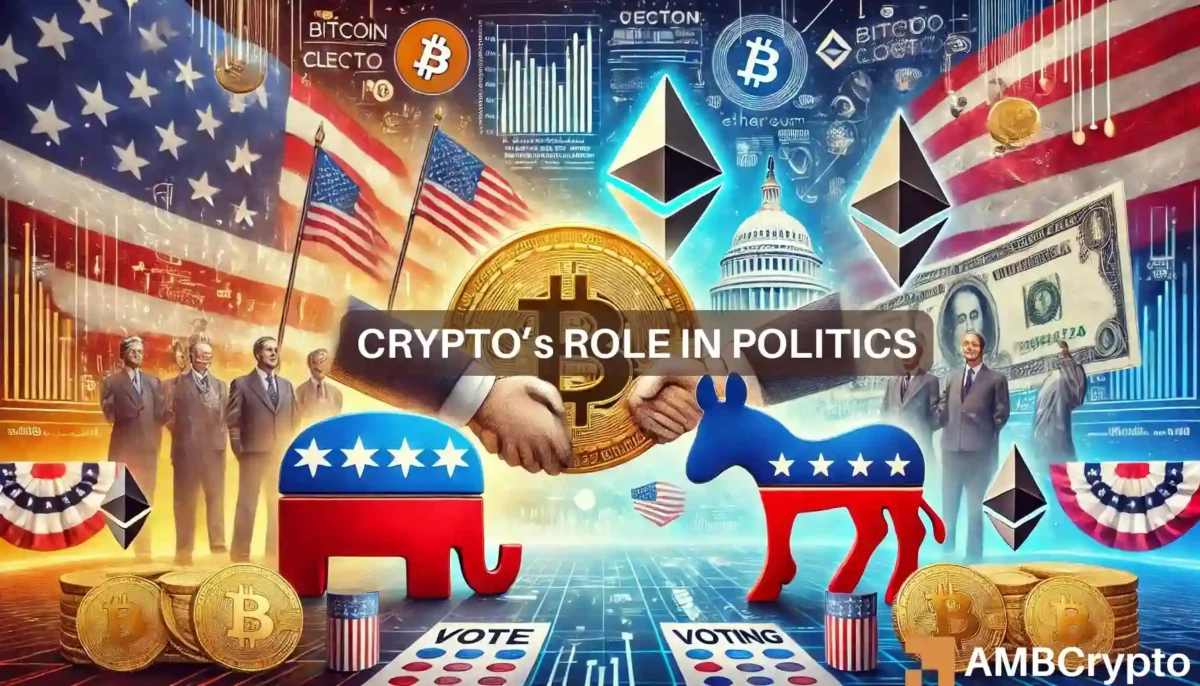Grayscale’s survey reveals why crypto is a major issue in 2024’s U.S. election

- Digital assets are evolving into a nonpartisan issue, indicating potential future growth.
- The 2024 U.S. election saw increasing voter openness to crypto, highlighting its growing significance.
Amidst ongoing challenges faced by both Grayscale Bitcoin [BTC] and Ethereum [ETH] ETFs, David LaValle, Grayscale’s Global Head of ETFs, has remarked on a significant shift in the digital assets landscape.
He observed that digital assets are increasingly transcending political boundaries, becoming a matter of broad relevance across the political spectrum.
Is digital asset adoption on the rise?
In a recent “Proactive Investors” interview, LaValle noted the broadening acceptance of digital assets as a positive sign for their future growth and stability.
He said,
“We have seen digital assets more broadly, go from being a partisan issue to a bipartisan issue. And now, I think it’s essentially a nonpartisan issue, which is probably the most bullish indicator.”
This brings us to the current scenario in the U.S., where the bipartisan nature of crypto policy is still evolving.
What’s Grayscale’s survey telling us?
That being said, a recent survey conducted by Harris Poll on behalf of Grayscale highlights the rising significance of cryptocurrency in the 2024 election cycle, even earning the nickname “Bitcoin Election 2024.”
The survey indicates that nearly 32% of voters are now more open to learning about or investing in crypto than earlier in the year.
Moreover, attitudes toward crypto are shifting positively, with a greater proportion seeing it as a viable long-term investment (23% versus 19% in November 2023) and an increased number considering it for their investment portfolios (47% compared to 40%).
Hence, as the November election approaches, it will be intriguing to observe whether the chosen candidates will embrace digital assets or dismiss them.
Execs weighs in for crypto being a bipartisan issue
Sharing a similar line of thought, Democratic Senator Chuck Schumer addressed the Crypto4Harris Town Hall, stating,
“We cannot afford to continue to sit on the sidelines because then we risk crypto going overseas to lowest common denominator countries where there will be no regulation at all.”
Expressing his commitment to pushing for pro-crypto legislation in the U.S. he added,
“I want to bring members on both sides of the aisle here in the Senate together, create momentum so we can pass sensible legislation that helps the United States maintain its status as the most innovative country in the world.”
Political divide: Is crypto playing a major role?
While former President Donald Trump has been notably vocal about his support for cryptocurrencies throughout his campaign, Vice President Kamala Harris has shown less enthusiasm for the crypto sector.
This dynamic is reflected in Polymarket prediction polls, where Trump initially led with 72% of the votes due to his pro-crypto stance, but Harris’s campaign only gained ground with the ‘Crypto for Harris’ initiative.
However, the recent speculation that Harris might appoint Gary Gensler as Treasury Secretary has stirred significant concern within the crypto community, given Gensler’s known skeptical stance on cryptocurrencies.
This shift resulted in Trump rising to the top with 52% of the votes once again, while Harris fell to second place with 47%.






